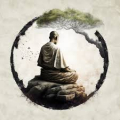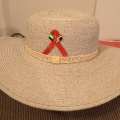What does a seeker after truth really seek?
 Jeroen
Not all those who wander are lostNetherlands Veteran
Jeroen
Not all those who wander are lostNetherlands Veteran
For me it was always a case of “I will know it when I hear it or when I read it” rather than “I know what I am looking for”. It is like an internal bell that tinkles. It didn’t really start ringing bells for me until I had my breakdown in 2012, and I started listening to Osho regularly again, and after that got involved in Buddhism. During my introductory course in Buddhism I saw this a lot, that people who had had an illness or accident or had lost a job or career would come do the course, in search of… something.
A lot of psychologists term this the search for meaning, but I don’t think it really is that. For me it starts with an understanding of the self, and that begins with the body-mind and an understanding of childhood. How we enter into the world, what we are from the very beginning, determines how we see ourselves in adulthood. Mental growth is a process of accreting things onto ourselves, and only later, in the process of understanding ourselves as mature beings, do we start to shed those layers.
Truth plays a special role in this. By seeking and learning to recognise truth we see the things that were hidden from our view. Clarity begins to dawn on us. And in the first instance we seek these truths outside ourselves — we seek to consult the wisdom of the world, as we have gotten used to doing in learning and education.
For me the clearest source of truth has been not religion or philosophy, but the words of the recent awakened ones, gurus and people who share their truth with us. Just in the last century, I would name Jiddu Krishnamurti, Osho, Ramana Maharshi, Papaji, Nisargadatta Maharaj, Eckhart Tolle and U.G. Krishnamurti. I name U.G. last because he is an end-point of the search. On their words you can hone your sense for the true… eventually our truth starts to erupt from within.
At that point you have found the things in yourself which correspond to the truths imparted by the wise, and you have found the things which are uniquely yours. All of which contributes to your truth. Which is my 0.02.
Maybe you have sought different truths?




Comments
Definitions are important here, the word truth can mean different things, two people can both be after truth while being in pursuit of distinct goals. Generally I use the meaning of truth as what continues to exist even when you stop believing in it.
There's a usage that I think conflicts with that definition when talking about personal truths, or lived experience as they say today. We all have perspectives that are important to us and can give us meaning. Someone's experience of the world has a large impact on their level of happiness and suffering. Very beautiful people generally get treated well by others and their experience of the world is often a kinder one than average. A devout theist will see evidence of God's work all around them. These things are true for them, the world is kind or cruel, beautiful or ugly, that's the way people move through life.
I always want to ask, what is it really? Theoretically it makes sense that there is an actual answer to that question. Though I think practically truth is really more of a pursuit and a mindset than an attainable goal. Do you reflect and ask the question? Also, as I've learned more about people's cognitive biases and put effort into negating my own, I've come to realize that while it helps, its really kind of an impossible task. We really rely on others to show us our blind spots. Truth kind of is a collective effort.
Regarding spiritual practice, I am skeptical about its truth claims about the world. When I say that I don't mean I believe they aren't real, I mean I don't know if they're real or not. I do know that people, including myself, are able to develop or uncover greater and greater levels of a balanced and expansive state of mind.
Its a complex and deep topic that I have a lot of interest in. I think I barely scratched the surface and no doubt didn't express things as articulately as the subject deserves.
Sukha
https://www.yogapedia.com/definition/5597/sukha
(also available in Buddhism)
Are you asking what is the real reason one is on the journey to free oneself from suffering? What motivation urges one to seek the truth? Or what is the truth of the seeker? One could be looking for end to suffering after encountering the four noble truths? One could be looking for power after hearing the acts done by some Buddhist masters? Personally I do not believe it matters because the person seeking can not ever find the truth of ones nature. That is because the person seeking thinks of themselves as a self that exist and is real. Only when one controls the attention of the mind and drops the essence of this self, the truth of ones nature will be seen.
The truth as always been there like the woman who thought she lost her head. People kept telling her that she has never lost her head. It is there on her shoulders. She could not believe nor understand. Then one day a person hit her over the head with a stick. The pain showed her where her head had always been. Sorry, Run away thoughts.
Truth is a measure of shedding the veils of delusion. Our view has certain attractors in it, things we like to see or ideas we are caught up in. Our thoughts regularly go to these spaces, and that is delusion.
So in order to see clearly we need to shed our enthusiasms, but also our dislikes, so that the distortions disappear from our seeing. Anything that we see as important, or that captures our enthusiasm, or becomes part of our my-making, can become an attractor.
These can be simple, natural things like children or sex. Or things from fantasy like dragons or heaven. Anything we attach value to can distort our seeing, our internal world. But also things we are afraid of or disgusted by.
In essence this is about detachment, letting go. My experience is this only happens once we see things as unreal and unimportant. It calls to my mind my favourite part of the Diamond Sutra:
“Regard this phantom world
As a star at dawn, a bubble in a stream,
A flash of lightning in a summer cloud
A flickering lamp - a phantom - and a dream.”
If you can truly regard the world like this, you will find detachment, and clarity of vision.
Self Satisfaction ....However...
It is a journey between two polarities, the drive to truth on the one hand, which is an active, searching principle. And on the other hand the acceptance of the world as it is, which is a passive, relaxing principle.
what does a seeker after truth really seek? find their marbles to play more?
your game thread is astounding. playing with our marbles is fun.
game 101:versatile your play. work is play. time for hard labor play
Absolute insert-big-word.
It’s funny you should mention the marbles for me that was a key moment in childhood where play turned into game with rules and win-lose and consequence.
for me that was a key moment in childhood where play turned into game with rules and win-lose and consequence.
yeah, i love playing marbles game as a kid.win or lose teach us kids how our society set the game of life. as we grow up we become smarter how to change the game. some love the win or lose senario. some mix it up and play zero sum game where its a win-win senario. personally, learning the zero sum brain game. zero zum is actually a buddhist training to me.
i dont remember the guy who created the win-win senario turning zero sum game upside down. beatiful mind was a movie of this life. i think he won noble prize in economics.
but more players in life are playing the win-win game, to neutralize old game of lose-win game.
his name is john nash, a beautiful mind, in game theory. his equilibriam theory is the buddhist goal the law of equality. in self be equal minded in body and brain. whole and balance. in the game of life without equalibrium, we go out of wack. going out of wack we get negative result. brain and body takes lost. of course shaki had the insight, his middle way therum is rediscovered by nash. avoid extreames, middleway is the way for healthy living. no xtreame endulgence and no xtreame denial in anything. we buddhist know this shit. the game of life is fasinating. play on.
.02 cents worth, recognize basic fact of the phenomenal world should be our base understandinding what is actual as a truth concept unfolding. science is a buddhist friend. ignorance is dukkha. common knowledge advance human kind. the earth revolve the sun, and not the sun revolve the earth advance our knowledge. but i like queer thinking, the flat earth is funny. a lot of mental gymnastic to propose that theory.
in buddhist the two truth spectrum link to the 0 factor emptyness is helpful to have a middle way mind. science catching up to quanta space, empty and full two nature in particles. another wind to the genius of buddhist thought, we buddhist know emptyness.
no inherent nature to be found but collary dependent origination or tai vetnamaze zen plum hill says interbeing all is one in empty space--cellular,molecular,quanta shit.
even our shit is buddhanature, yay.
footnote:
the two truth, conventional dharma phenom and ulti-mate truth, empty. the middle way mindset, in me, live with conventional dharma truth but deep seeded practice awareness of ultimate truth, through negation all s.a.m beings from dog to us is empty "sense" nothing to cling to. thus avoid extreame thinking this or that. nothing is eternal and nothing anayalated.
“The only true wisdom is in knowing you know nothing.”
— Socrates
to add to socrates,nothing is bliss. follow your bliss. happy in not knowing/knowing is
wise gnosis. it one of the side effect of buddha or christ nature. science of mind says the brain stores so many information called arrisal and subsist settle back in our space brain.subconcious and concious interplay. just a hunce. gnosis just happen. such as dejavu feedback in our brain. or knowing the right action perfectly. its gnosis goku ultra instinct one with empyness.
What does a seeker after truth really seek?
For me personally - acceptance. Of my place in life, of others' views and opinions (this is a biggie for me at this point and is a large reason why I'm not very active on here and other forums), and of the fact that I can't control most things in life.